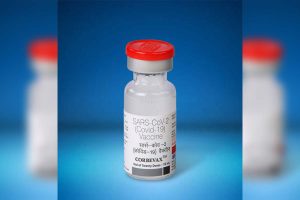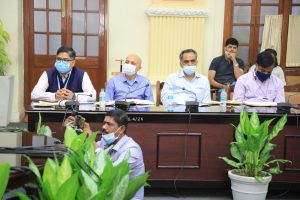Minister said that despite 100 percent jab of two doses of the Covid-19 vaccine, only 17% of people have taken the booster dose in the state.

Karnataka Health Minister K Sudhakar at Covid 19 TAC meeting held on Thursday in Karnataka. (Supplied)
Karnataka Health Minister K Sudhakar on Thursday, 11 August, warned private hospitals in the state of dire consequences if they denied treatment to Covid-19 patients.
After the Technical Advisory Committee (TAC) meeting — called to discuss the increase in the positivity of Covid-19 cases in the state — Sudhakar told reporters, “We have received complaints from people that private hospitals are denying treatment to patients suffering from Covid-19.”
He added, “Legal action will be taken against hospitals refusing to treat Covid-19 patients. No hospital can deny treatment to a Covid-19 patient saying that they don’t treat patients suffering from the disease. Every hospital must treat Covid-19 patients in isolation wards.”
The health minister also said, “This is inhumane and also illegal. If any such complaint is received, strict action will be taken against the hospital under the KPME and Epidemic act.”
With Covid-19 cases on the rise in Karnataka, Sudhakar told the reporters that people are reluctant in taking the precautionary booster dose.
“People are not taking the booster dose even when it has been made available for free. It amounts to negligence. We as responsible citizens must avail booster shot to enhance immunity,” he added.

Corbevax is currently being used to inoculate children between 12 and 14 years under the Covid-19 immunisation programme.
(Supplied)
Expressing disappointment, Sudhakar said that despite 100 percent completion of the initial two doses of the Covid-19 vaccine, only 17 percent of people in the state have taken the booster dose.
As for why, the minister said, “Many have become complacent and overconfident that nothing will happen to them as they survived the previous Covid-19 waves.”
Urging people to get their third jab, he said, “Experts across the world suggest that the immunity decreases or wanes after six-seven months of taking the vaccine, and the booster dose is required to increase immunity again.”
He added that the booster dose helps reduce hospitalizations and deaths.
Meanwhile, the state government will start administering Corbevax, the recently approved vaccine for the booster dose, from Friday.
He stated that Corbevax could be taken as a booster dose whether an individual had taken Covaxin or Covishield for their first and second doses.

Health department officials and TAC committee members in the meeting held in Bengaluru. (Supplied)
The Karnataka government has also issued an advisory for Covid-19 patients above the age of 60 and with comorbidities to visit a hospital or a doctor and seek treatment. Sudhakar reiterated that it was an advisory and not mandatory.
Karnataka, in the last month, has seen an uptick in Covid-19-related deaths.
According to health department data, 42 people died of Covid-19 last month, and the majority of them were above 60 years oaf age and had comorbidities.
The state government has decided to expand the TAC set up for Covid-19 to look into malaria, dengue, and public health as a whole in Karnataka.
Sudhakar said entomologists and microbiologists would also be included in the committee to monitor the surge in vector-borne diseases.
He added that except for malaria, vector-borne diseases were showing an uptick due to heavy rains and floods.
The minister said, “Malaria cases decreased from 419 in 2021 to 116 in 2022. However, Dengue has increased from 1,266 in 2021 to 4,405 in 2022. Similarly, chikungunya has increased from 454 to 978, while H1N1 saw a massive increase from three to 345.”
Sudhakar said the number of dengue cases could probably be high because of increased testing of the disease in the state. “Around 9,000 people were tested for dengue in 2021, while 36,000 people have been tested in 2022,” he added.
According to the health department, most cases of dengue were detected in the BBMP area within Bengaluru Urban, Mysuru, Udupi, Dakshina Kannada, and Hassan.

May 02, 2024

May 02, 2024

May 02, 2024

May 02, 2024

May 02, 2024

May 02, 2024